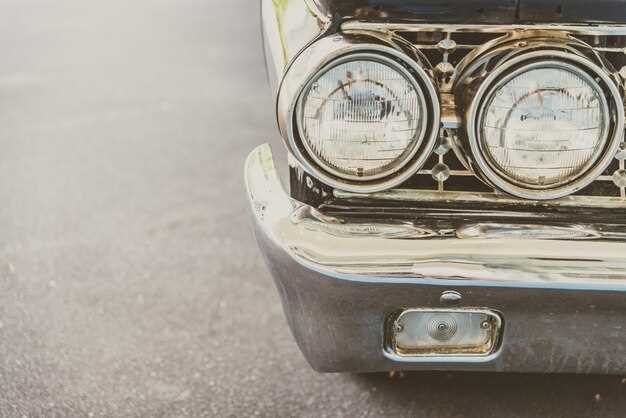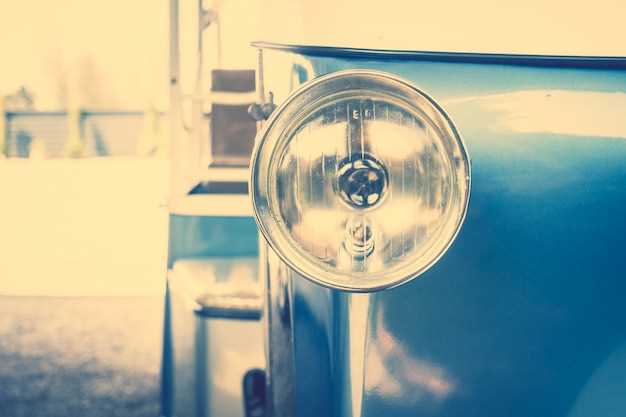

Investing in vintage cars has emerged as a popular avenue not just for auto enthusiasts but also for astute investors seeking to diversify their portfolios. These iconic vehicles extend beyond mere transportation; they represent a fusion of history, craftsmanship, and nostalgia, making them desirable assets for both collectors and investors alike.
The market for classic cars has shown remarkable resilience, often outperforming traditional investment options. As more people turn to tangible assets, the vintage car segment has become a viable option. However, successful investment in this niche requires a strategic approach, focusing on factors such as rarity, condition, and heritage of the vehicles. Understanding these elements can significantly enhance the value of a collector’s portfolio.
Furthermore, long-term investment strategies must encompass comprehensive research and knowledge of market trends. This involves keeping track of auction results, following collector communities, and analyzing restoration costs. By adopting a well-informed approach, investors can capitalize on the potential appreciation of vintage cars while enjoying the unique experience of collecting something that transcends time.
Evaluating Market Trends for Classic Car Valuation
Investing in classic cars can be a lucrative venture, but understanding market trends is crucial for accurate valuation. Here are key considerations to evaluate when assessing the value of vintage cars:
- Historical Significance: Certain cars have gained value due to their historical importance. Research models that are rare or have unique stories, as these tend to appreciate more over time.
- Market Demand: Analyze the current demand for specific brands and models. Popular models can appreciate rapidly, while less sought-after cars may not. Consider following auctions and classic car shows to gauge interest.
- Condition and Restoration: The condition of the car plays a significant role. Cars that are well-preserved or have had quality restorations typically hold higher value. Get professional appraisals to determine worth accurately.
- Usage Trends: Evaluate how trends in transportation impact classic car valuation. With increasing interest in sustainable transport, some classic cars may see shifts in desirability based on fuel type and efficiency.
- Global Market Influences: Monitor how international markets affect local valuations. Economic shifts can influence demand and pricing, particularly for high-end models favored by collectors worldwide.
Utilizing these tips will enhance your understanding of the classic car investment landscape. Conducting thorough research and staying informed about market dynamics are essential steps in making sound investment decisions in vintage cars.
Maintenance and Restoration: Maximizing Asset Value

Maintaining and restoring vintage cars is crucial for collectors aiming to maximize the asset value of their investments. A well-preserved vehicle not only appeals to potential buyers but also ensures a higher resale price. Understanding the nuances of restoration is essential for any collector.
Regular maintenance is foundational in preserving the condition of classic cars. This includes routine checks on the engine, transmission, brakes, and suspension. Keeping detailed records of all maintenance work can enhance the car’s provenance, which is a significant factor in value assessment. Use high-quality oils and parts specifically designed for vintage vehicles to ensure longevity and performance.
When it comes to restoration, authenticity is key. Collectors should prioritize using original parts whenever possible. This not only maintains the car’s historical integrity but also significantly boosts its market value. Modifications, while sometimes necessary, should be done thoughtfully, preserving the original character of the vehicle as much as possible.
Consider hiring professionals with expertise in vintage restoration. Their knowledge can prevent costly mistakes and ensure the project is completed to a high standard. Engage with skilled craftsmen for bodywork, upholstery, and mechanical repairs to enhance the car’s appeal.
Documentation of the restoration process is also vital. Keep track of all receipts, photographs, and correspondence related to the work done. A comprehensive history of the car aids in building trust with future buyers and justifying the investment made over time.
Lastly, store your vintage cars in a controlled environment. Protecting them from extreme temperatures, humidity, and sunlight adds years to their lifespan. Proper storage techniques, such as using covers and maintaining optimal tire pressure, can prevent unnecessary wear and tear.
Building a Diverse Collection: Tips for New Investors

Creating a diverse collection of vintage cars is a vital strategy for new investors looking to secure long-term financial growth while enjoying their passion. Diversification has the potential to mitigate risks and enhance overall investment value.
Start by researching various types of vintage cars, including classics, exotics, and muscle cars. Each category often appeals to different buyer demographics, providing a balanced approach to your collection. Consider investing in cars from different eras to capture a wider range of market trends and interests.
Evaluate the historical significance and rarity of each car. Limited production models or cars with unique specifications often appreciate more significantly over time. Seek out vehicles with sound provenance, as their documented histories can add to their value as investment pieces.
Networking within the vintage car community is essential. Attend auctions, car shows, and collector events to gain insights from experienced investors and gather tips on trends. Connecting with established collectors can lead to potential partnerships and access to unique investment opportunities.
Be mindful of the vehicle’s condition and maintenance requirements. Investing in well-preserved or restored cars can minimize future costs and maximize interest from potential buyers. Additionally, understanding your storage options is crucial; climate-controlled environments can protect your investment from deterioration.
Finally, always remain flexible in your investment strategy. The vintage car market is influenced by trends and economic conditions, so being willing to adapt your approach ensures that your collection not only grows in diversity but also in value over time.





